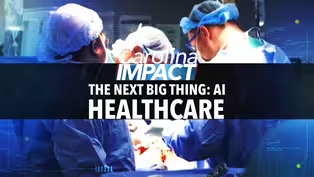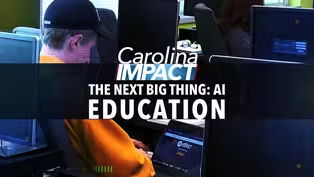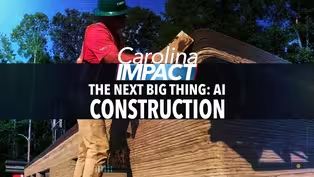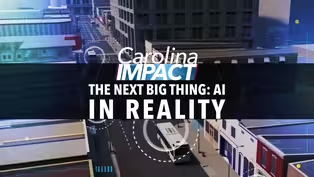
Carolina Impact: May 30, 2023
Season 10 Episode 27 | 29m 49sVideo has Closed Captions
Printing 3D Habitat Homes, Medical AI, using AI in our communities, & Chat GPT.
How 3-D printers using AI create affordable housing - faster, cheaper, and maybe better; Surgeons at Atrium Health in Charlotte are developing AI technology to improve hernia surgery outcomes; AI can be used to improve the lives of people in Charlotte, but what are the consequences? And How Chat GPT Changes our every day lives.
Problems playing video? | Closed Captioning Feedback
Problems playing video? | Closed Captioning Feedback
Carolina Impact is a local public television program presented by PBS Charlotte

Carolina Impact: May 30, 2023
Season 10 Episode 27 | 29m 49sVideo has Closed Captions
How 3-D printers using AI create affordable housing - faster, cheaper, and maybe better; Surgeons at Atrium Health in Charlotte are developing AI technology to improve hernia surgery outcomes; AI can be used to improve the lives of people in Charlotte, but what are the consequences? And How Chat GPT Changes our every day lives.
Problems playing video? | Closed Captioning Feedback
How to Watch Carolina Impact
Carolina Impact is available to stream on pbs.org and the free PBS App, available on iPhone, Apple TV, Android TV, Android smartphones, Amazon Fire TV, Amazon Fire Tablet, Roku, Samsung Smart TV, and Vizio.

Introducing PBS Charlotte Passport
Now you can stream more of your favorite PBS shows including Masterpiece, NOVA, Nature, Great British Baking Show and many more — online and in the PBS Video app.Providing Support for PBS.org
Learn Moreabout PBS online sponsorship- [Announcer] Support for "Carolina Impact" comes from our viewers and Wells Fargo.
- [Narrator] Wells Fargo has donated $390 million.
- Honey, like I said, you get your own room.
- [Narrator] To support housing affordability solutions across America.
Doing gets it done.
Wells Fargo, the bank of doing.
(upbeat music) - [Host] This is a production of PBS Charlotte.
This week on a special "Carolina Impact."
- That came on like a tidal wave.
All of a sudden it was there.
- [Host] Artificial intelligence is supposed to make us smarter.
- People are trying to write entire essays, like entire papers.
- [Host] And maybe healthier.
- It's very difficult, and there isn't one day that goes by that I don't cry.
- We don't want to have people in a pipeline where they keep getting operation after re-operation.
- [Host] It even makes building new affordable homes easier.
- And that's kind of the beauty of this type of construction.
- [Host] But how do we keep this AI technology from doing too much.
- So, nothing is original.
- [Host] And knowing too much.
- Can this algorithm track me?
Can it be biased against me?
- [Host] Tonight, PBS Charlotte talks to the experts about the best and worst of artificial intelligence, as "Caroline Impact" looks ahead, to "The Next Big Thing: AI."
- Good evening.
Thanks so much for joining us for this special "Carolina Impact."
I'm Amy Burkett.
According to the Pew Research Center, 45% of Americans say they're equally concerned and excited about artificial intelligence, while 37% express just being concerned about what letting this genie out of the bottle could lead to, whether it's calling out to your Siri or Alexa device, putting in directions and navigation on your phone, autocorrecting spelling while typing a text or email, social media apps and music and video streaming, they're all forms of artificial intelligence.
Most AI seems to be making our lives a little bit easier, but "Carolina Impact's" Jason Terzis is about to show us when it comes to education, people are wondering if the technology is going to go just a little too far.
(funky music) ♪ I'm going down south by going have myself a time.
♪ - [Jason] The adult cartoon, "South Park," a mainstay on Comedy Central for the last 26 years.
The show has evolved from the escapades of four crude, foulmouthed kids to one that makes fun of celebrities and provides social commentary on current events and issues.
- We want privacy!
We want privacy!
- [Jason] This season, the show delved into the topic of artificial intelligence and its newest wonder, ChatGPT.
- ChatGPT?
- Yeah, dude.
There's a bunch of apps and programs you can subscribe to.
They use open AI to do all your writing for you.
People use 'em to write poems, write job applications.
- [Jason] Owned and developed by Open AI, a leading artificial intelligence research company, ChatGPT generates human-like replies to questions.
The new technology has been making countless headlines since its November release.
Denounced by many as a free essay writing, test taking tool that makes it super easy for students to cheat on writing assignments.
- Because it came on like a tidal wave.
- It's inevitable.
This is like trying to keep the tides away or trying to keep the sand from being eroded on the beach.
We can't stop it.
- [Jason] The technology mimics the brain's ability to process information, drawing its responses from websites worldwide.
- So, you are just giving the artificial intelligence the parameters and saying, go.
- Write a poem about the sun, like according to Edgar Allen Poe or something.
And then it just wrote like this original poem.
- It's sort of taking over our brains for us in a way.
- [Jason] Central Piedmont Community College, Professor of Information Technology, D.I.
Von Briesen, is fascinated by ChatGPT.
During our visit, he asked it to create various artistic images, as well as a letter of recommendation for me.
- Jason is a talented writer who's able to distill a complex, distill complex information in the clear and engaging prose.
I can't write like that!
I mean, I could.
It would take a while, right?
He has a knack for crafting compelling narratives that make complex topics accessible to a wide audience while maintaining the rigor and accuracy that is essential to good journalism.
Jason, I love you already.
- [Jason] And therein lies part of the problem.
Because it's pulling from all sorts of websites, what ChatGPT spits out may or may not be factually accurate, leaving many to wonder where's it getting this information from?
- I'm so curious with just how it works, and how it thinks.
Like I'll just throw whatever I can at it and see what it, what it throws back at me.
- [Jason] Of course, having access to this sort of technology makes it very tempting for some students to want to take advantage of.
- And we also have another student who wrote a shockingly good paper.
This one's called a Feminist Neoliberal Perspective of Post-War Afghanistan by Eric Hartman.
- Ah, yes, thank you, thank you.
(ominous music) - It is very tempting, like because there's no way to check it, and it's very original, and it is also capable of citing sources.
- It's really the highest form of plagiarism, because ChatGPT is just this mastermind at pulling from written phrases, so nothing is original.
- Liz Rogers teaches English and journalism at Central Piedmont.
During her 30 plus years as an educator, she's seen it all, from the pre-internet days of students using Cliffs Notes and copying directly out of books to now using ChatGPT.
- And it worries me that the more, the easier it is for students to not create original work and to rely on some other source for doing it, they're not, they're cheating themselves, because they're not developing the skills.
- If too many people are doing that, we're gonna get a sort of generation of people that are not as articulate in creating their own words or their own ideas, concepts.
- This is just another tool, like Google's another tool, like the internet is another tool.
You can imagine how people started to feel about the internet when it first came on from an academic perspective.
You don't have to go to the library?
Remember the card catalog?
You don't have to go do the stacks and get the book.
Some people are like, woohoo!
Other people are like, oh, that's just terrible.
Kids don't know how to research anymore.
And then we move on to Google, which sort of stepped up the game for search engines, and now we're at the next step of that.
It's not search engine, it's creation engine.
- [Jason] This spring Central Piedmont revised its academic integrity policy, adding AI generated content as a no-no, unless a professor says it's okay and students cite its use as a source.
- All of the schools are freaking out.
Some of them want to band it entirely.
- Their normal detection software that teachers are using, like tab switching, all this different thing, it's gonna be very, very difficult for them to actually determine if this was AI generated or the student wrote this.
- It's just a shame that we have to bog it down with a chase for accuracy and integrity.
It should just be a given.
- You know, do we just give paper tests, you know, pencil on paper, and then we have to manually grade that now?
Because that's the only way to confirm that you really know it.
- [Jason] Technically not intended for children under 18, students in Charlotte Mecklenburg schools do not have access to ChatGPT on their school issued Chromebooks.
- We can block it in our district, but it isn't gonna be blocked on a personal device.
- [Jason] But CMS Chief Technology Officer, Candace Salmon-Hosey is taking a wait and see approach towards it, while getting feedback from teachers and administrators.
- Our instructors and our instructors and our staff can use this product to benefit and to augment and enhance the lessons that they're working on.
- [Jason] Salmon-Hosey isn't rushing to judgment of ChatGPT, mainly because she's seen this type of thing before, back when many districts banned websites, such as YouTube and Wikipedia, which are now each widely regarded as valuable learning resources.
- You can use this product for creative lessons, for group work, to create more engagement and reflective practices, to talk about the process of learning how to write.
- [Jason] The world is ever changing.
So too is technology and the way we gather and process information.
- Fighting the technology is just kind of going the wrong direction.
But that doesn't answer the question of what we do about it.
- [Jason] But what we do with that information is still being analyzed and figured out.
- AI is gonna be a part of what we do, just like the internet is a part of what we do, and we're going to, we need to learn how to live with it.
- [Jason] And time will certainly tell how this latest technology will be or won't be put to use.
For "Carolina Impact," I'm Jason Terzis reporting.
- Thank you, Jason.
In February, a survey was commissioned by the Walton Family Foundation, consisting of 1000 K12 teachers and another 1000 students between the ages of 12 and 17.
The survey found that more than half of the teachers had used ChatGPT, 10% of them reporting using it every single day, while only about 1/3 of the students had tried it.
Nearly 90% of the teachers and 80% of the students who used it said it had a positive impact.
Well, artificial intelligence has tremendous potential and is increasingly becoming a part of our daily lives.
The language and image recognition capabilities of AI systems have developed incredibly rapidly, but it has also raised privacy concerns and issues around who will have access to the information.
At UNC Charlotte, students are developing programs designed to assist people in their everyday lives, from catching a bus to staying safe in a dark parking lot.
As Beatrice Thompson shows us, the advent of artificial intelligence means the world as we know it is changing rapidly.
- AI is gonna be something that we are gonna have everywhere.
- It can help citizen to live easier in cities.
- In the relatively near future based on how fast everything is growing, it's unavoidable that AI's gonna affect our society in a big way.
- [Bea] Artificial intelligence or AI for short, it's been talked about.
- Artificial intelligence.
- And artificial intelligence.
- Artificial intelligence.
- [Bea] And now it's practical applications are showing up in all areas of life, and in ways you may not have considered.
Like the need to get from point A to point B, when you depend on public transportation.
- First times do make a difference.
Sometimes they're late, you know, which makes you late, for other, you know, your appointments.
- Travel time.
I think the travel times will be better with your understand that they need more drivers.
- That's the benefit of AI in general-- - [Bea] And in these classrooms at the University of North Carolina at Charlotte, they've received grants to study artificial intelligence.
These graduate students are working on answers to problems like these, by simply using AI to design programs to make systems like public transportation more efficient.
For the professor who started the program at the university, it's breaking new ground on how artificial intelligence can be used in everyday life situations.
- That's why we as a research university, we are working with public policy makers, stakeholders, local communities to co-create and co-design the technology, and give it to them so they can use it for their own benefit.
- There is a gap between research and actually using it in real world.
And what we are doing here is that we are trying to fill that gap.
- [Bea] In the case of public transportation, during their project research, the student teams talked to writers.
Their point?
Determine where they should start the building of an AI solution for transit issues.
- It was helpful for us to know from different aspects and different locations around the city that what are the problems and how we can, you know, implement the AI to reduce those waiting times and improve the reliability and future.
- We want to use a real time information, like weather condition, like the traffic condition, and also the demand of passengers to make actually this goal achievable.
- [Bea] And while getting people and buses to where they need to be is one way AI can make life easier, the University of North Carolina at Charlotte students are also looking into other applications of artificial intelligence that concerns safety.
Ranging from getting to a car safely in a dark parking lot, to the various ways it could assist law enforcement.
- The AI learns what normal behaviors in an environment look like, and when an abnormal behavior happens, it can tell you not only there's an abnormal behavior here, but how abnormal it is.
- As a woman, I feel like, okay, maybe I cannot feel safe in any environment, but having this in mind that there is a surveillance system that can detect anything, kind of makes me feel more relieved, because I know that there's something watching.
(ominous music) - [Bea] But is this the Orwellian future?
What about profiling?
(sirens wailing) How will law enforcement utilize the information?
Does artificial intelligence take profiling to a new level?
Concerns these developers are well aware of.
- Can this algorithm track me?
Can it be biased against me?
And part of that is the way we have to specify one, these algorithms to be explainable and interpretable, so that we know what decisions it's making based off of what it sees.
And we know whether it's actually keeping track of your information.
- If we don't design AI in a responsible, ethical manner, that's always a concern and we should be aware of it.
- It's not just regulating the AI, but also we can use AI to help us regulate better and more dynamic, based on the needs and based on the requirements and also based on the values of the society.
- [Justin] Well, I divided by it and basically.
- [Bea] So what comes next?
For a PhD candidate, Justin Sanchez, who already works remotely on AI projects for major automaker, it's going to be up to the public to ask key questions about this technology.
- Basically being surrounded by all these AI products, you have to look and see are they actually, do they have a privacy policy?
What technologies they're actually using?
Is that data going to be saved?
And actually to push for regulations for that sort of stuff.
- [Bea] The time of artificial intelligence in many forms has arrived, yet the unanswered question for many may well be, is this the genie that should be let out of the bottle?
For "Carolina Impact," I'm Bea Thompson.
- Thank you so much.
Bea.
The UNC program is also working with Central Piedmont Community College, aiding its students in developing their own AI safety programs designed to monitor parking lots around the college.
Well, artificial intelligence is transforming the modern medical landscape too.
From medical imaging and disease detection to patient analytics and drug development.
"Carolina Impacts" Rochelle Metzger and videographer, John Branscomb take us inside Atrium Health, where doctors are combining smartphone apps and AI technology to help predict and improve patient outcomes.
- [Rochelle] Artificial intelligence is increasingly being used in hospitals to provide more efficient and effective patient care.
- Surgery.
This patient, no question is benefited from ai.
- [Rochelle] Doctors at Atrium Health in Charlotte are using cutting edge AI research to create the next generation of healthcare technology.
- Artificial intelligence is here, it's coming.
Don't hide from it.
We have to embrace it.
- Dr. Todd Heniford, chief of gastrointestinal and minimally invasive surgery and his team developed two award-winning smartphone apps that predict surgical complications for hernia repair patients.
- The first app that we did, we had 1700 patients and over 2 million data points.
Once you get that much information, you can start to predict outcomes and all it is is a complex mathematical equation.
And so our first app was about quality of life after hernia repair.
- [Rochelle] According to Heniford, the world's first artificial intelligence tool for predicting hernia surgery outcomes provides greater accuracy and insight, so doctors can make better decisions.
- What they demonstrated is they could take preoperative CAT scans that we had previously done a mathematical equation on, and do dramatically better, and helping us take care of patients and predict outcomes in patients prior to surgery.
- [Rochelle] Team members, doctors Sharbel Elhage and Sullivan Ayuso say the new AI model is machine learning that builds on 1000 of CAT scans, years of research and patient data.
Dr. Elhage explains how it works.
- We structure the algorithm to take a look at these images and teach itself, so it gets a set of images, a big set of images where it knows what the outcome is, what the yes/no outcome is for whatever variable we're looking at.
And then it goes through those images 1000 of times, and just keeps going through until it thinks, okay, I've got it.
I can now find nuanced pixel changes in these images that allow me to differentiate a positive outcome versus a negative outcome.
- The AI associated marketplace is growing rapidly, thanks to medical institutions like Atrium Health, developing the next generation of AI power tools.
A 2020 publication in the National Institutes of Health estimates that AI applications could cut annual US healthcare costs by $150 billion by 2026.
Hernia specialists at Atrium Health say a majority of hernia cases requires straightforward operations, but 20 to 30% of patients develop complications that might have been prevented.
- Why are we focusing on this so much?
It's because wound complications put you at risk for developing a recurrence of a hernia, right?
We don't want to have people in a pipeline where they keep getting operation after re-operation.
- [Rochelle] A devastating situation patient Scott Gilpin knows all too well.
- It's very difficult and there isn't one day that goes by that I don't cry.
- [Rochelle] It's been an emotional journey for Gilpin who lives in Florida.
A routine surgery to repair an abdominal hernia turned into a series of failed surgeries.
For nearly a year, Gilpin battled sepsis, blood clots, and numerous complications.
- Having to teach myself how to walk-- (voice breaking) How to walk again.
And then you have to carry a bag around with bandages, a change of clothes because, wear an colostomy bag, because you never knew when this bag was gonna break or was gonna start leaking.
- [Rochelle] Eventually Gilpin traveled to Charlotte for treatment at Carolina's Hernia Center.
Dr. Heniford and his team used predictive technology to draft a game plan.
Then they operated, and soon Gilpin was on the road to recovery.
- No one should have to go through what I went through.
And if you take the skill of him and his team, together with this artificial intelligence, I mean, it can only help more people, save more people.
- [Rochelle] Though Gilpin surgery was corrective, Heniford says complex cases like his are best treated in specialty clinics that have highly trained surgeons and the resources to handle problems.
While doctors can make educated guesses as to who those patients will be, machine learning provide certainty.
- What a surgeon in a smaller community can do is put that patient's CAT scan into this AI project, and say, well, this patient has a significant chance of developing pulmonary failure.
That patient needs to go to a tertiary center.
- [Rochelle] The AI model has shown positive results with atrium patients.
The hospital is about to start a prospective trial, in addition to testing patients outside Atrium's system.
- Something we're trying to avoid, which is pushing things out too early.
So, I think we're trying to be responsible about making sure our algorithm is functional in various patient populations.
- [Rochelle] Artificial intelligence has the potential to revolutionize the way healthcare is delivered.
Dr. Ayuso says it's fitting as patients themselves become more savvy.
- Everything's really at the tip of these patients hands.
And so people come into the clinic and they're asking much more cerebral questions than they have in the past.
And I think that this sort of technology actually, you know, will appease a lot of people.
- [Rochelle] But most importantly, it will give people a new chance at life.
For "Carolina Impact," I'm Rochelle Metzger.
- Thank you so much, Rochelle.
You'll find a link on our website with more details at pbscharlotte.org.
Well, we wrap up our look at artificial intelligence tonight with one use of AI that's not here in Charlotte yet, but might be soon.
We're talking about 3D printed houses with AI assisted equipment doing the work, so that more families can find a home sweet home they can afford.
"Carolina Impact's" Jeff Sonier and videographer, Doug Stacker, take us to Newport News, Virginia, where those high tech, low cost 3D homes are already a reality.
- Yeah, here in Newport News, the big news in affordable housing is how Habitat for Humanity is using the latest in construction technology to solve one of the oldest problems facing a lot of cities; how to build more affordable housing fast.
- On a traditional built house, you would have to lay a foundation, the cinder blocks and the bricks around the bottom.
You would have to add a floor system.
And then build the walls.
So, in contrast to that, it is quite a bit quicker to do this.
- [Jeff] Craig Meadows has a 30 year career of building homes the old-fashioned way.
- You'll have an L-shaped kitchen that comes around here.
The refrigerator is on the end.
We have a nice island here.
- [Jeff] But now he's walking us through something brand new.
- And when it gets to the windows, it'll actually stop and create the windows itself.
- [Jeff] A 3D printed house that may just be the home of the future.
- So what you're seeing here is the 3D printed finish.
- Meadows is chief of construction for Habitat here in Newport News in Williamsburg where that 3D future is now, with 3D homeowners already moving in.
(people cheering) To the first 3D printed houses in the country, not just new homes, but also affordable homes.
- When we turned over the house and realized that we were gonna be the first entity in the United States to put a homeowner and a 3D, I was living it.
We were living it, and not just thinking about it.
- [Jeff] 3D doing in days at this work site, what often takes weeks, using AI assisted blueprints to quickly form concrete walls and windows spaces that are thicker than brick or board.
- This fresh layer for the next day bonds to the layer below it.
- So that 3D printer goes layer, layer, layer, layer all the way around the perimeter of the house.
- That's correct.
- [Jeff] In their early stages, these 3D homes look sort of like something from "The Flintstones," but after they're finished, well, see for yourself.
- We have gotten calls from everybody, including North Carolina to ask us about how this process works.
And I know every day that more people are exploring the idea of 3D printing.
- [Jeff] Habitat's CEO Janet Green explains that their 3D printed homes actually cost 15% less to build than Habitat's traditional homes here in Newport News.
And because 3D is also so quick to get those thick concrete walls up, 3D printing saves habitat both time and money.
- It was faster for us, it was more cost effective.
And we'll have a more energy efficient product for the Habitat families that are gonna buy these homes.
- [Jeff] Here at these new side by side 3D homes in Newport News, Sierra Romas and Corinne Mann say they're excited to be Habitat's first 3D next door neighbors.
This is Corrine's 3D home here on the right.
- I'm actually happy I picked my house as a 3D home, and to know that I'm one of the few who in the beginning right now that has this home.
I feel like that's gonna be like the next couple of years.
Other people are gonna have that house too.
So, I'm the start of it.
- [Jeff] And that's Sierra's 3D home over on the left.
- In an economy like this, first, it's a rare opportunity to be able to afford a house, let alone have a 3D house.
And so to me that means stability, and that it's more innovative, it's more sturdy, it's more durable.
I get to be a part of the first.
So, it's only gonna get better from here.
- 3D printing is just another tool in the toolbox.
It's not going to solve our affordable housing crisis, but we are happy to be the first to try this new technology.
- You've got two houses on this side of the street, but you see what a whole 3D neighborhood across the street?
- I think that would be terrific, if we could do 10 and 20 homes at a time.
The machine is quite quiet and we could run the machine 24 hours a day if we wanted.
That way we can create more affordable housing.
- [Jeff] Which brings us back to Charlotte.
- Yeah, it's my understanding that, you know, they're framing up the one story house in a day, day and a half versus wood construction.
- [Jeff] Where Habitat's already building larger developments like their newest neighborhood here off West Boulevard.
- Our site here is 39 home sites.
And so yeah, we're looking at all the technology, 3D printing, prefabrication.
If you have a 20 lot or a 30 lot neighborhood, that's where it becomes more practical.
- [Jeff] And maybe even more necessary, says VP for construction, Bob Glusenkamp.
Especially when you look at Charlotte's need for affordable housing.
- Our pipeline of homeowners is enormous.
Last year we took over 1900 applications for, in a single year.
We'll build at a maximum 75 to 100, or we'll start that many new homes.
So yeah, I think it's part of, I think it's part of the overall puzzle.
- [Jeff] And Glusenkamp adds that solving that puzzle in Charlotte may start with what they're building here in Newport News.
- Well, I think first of all, I mean aesthetically I think it looks great.
I mean, it looks kind of like a, you know, a rough stucco finish to it.
I mean I've seen 3D printing on small models, you know, two or three feet.
But to take it to something that's say 1200 square feet, that's pretty significant.
You know, they're the first ones to do it.
I think it, you know, will spread very quickly.
The ease of it, the speed of it, people will take off.
But you know, somebody has to be first.
- And Habitat leaders here at Newport News and Williamsburg, as well as back in Charlotte say, it's not about how many 3D printed homes they build or how many traditional homes they build.
It's about how many families they can move into that affordable housing.
That's the real measure of success.
Amy?
- Thank you so much, Jeff.
It's always nice to see what's going on in other places of the country.
Well, to find out more about the first ever 3D printed houses that Habitat is building in Virginia, check out our website at pbscharlotte.org.
We'll link you to Habitat's Newport News 3D program, including virtual tours of those two new 3D habitat homes featured in our story.
Well, before we leave you tonight, I wanna go back to the National Pew Research I mentioned at the beginning of our program.
The survey also found that 44% of Americans believe widespread use of driverless passenger vehicles would be a bad idea.
There's often good and bad in everything, and AI seems to be no different.
Well, thank you so much for joining us for this special "Carolina Impact."
Goodnight, my friends.
(upbeat music) (soothing music) - [Announcer 2] A production of PBS Charlotte.
- [Announcer] Support for "Carolina Impact" comes from our viewers and Wells Fargo.
- [Narrator] Wells Fargo has donated $390 million.
- Honey, like I said, you get your own room.
- [narrator] To support housing affordability solutions across America.
Doing gets it done.
Wells Fargo, the bank of doing.
Carolina Impact: May 30th, 2023 Preview
Preview: S10 Ep27 | 30s | Printing 3D Habitat Homes, Medical AI, using AI in our communities, & Chat GPT. (30s)
How Artificial Intelligence Is Helping In The Medical Field
Video has Closed Captions
Clip: S10 Ep27 | 5m 46s | Atrium Health in Charlotte is developing AI technology to improve hernia surgery outcomes. (5m 46s)
How ChatGPT Is Changing The Face of Academics
Video has Closed Captions
Clip: S10 Ep27 | 6m 45s | ChatGPT can answer questions & write papers, all with a few simple commands. (6m 45s)
Printing 3D Homes With Artificial Intelligence
Video has Closed Captions
Clip: S10 Ep27 | 6m 29s | How 3-D printers using AI create affordable housing - faster, cheaper, and maybe better. (6m 29s)
UNCC Students Using Artificial Intelligence In Our Community
Video has Closed Captions
Clip: S10 Ep27 | 5m 21s | AI can be used to improve the lives of people in Charlotte, but what are the consequences? (5m 21s)
Providing Support for PBS.org
Learn Moreabout PBS online sponsorship
- News and Public Affairs

Top journalists deliver compelling original analysis of the hour's headlines.

- News and Public Affairs

FRONTLINE is investigative journalism that questions, explains and changes our world.












Support for PBS provided by:
Carolina Impact is a local public television program presented by PBS Charlotte




